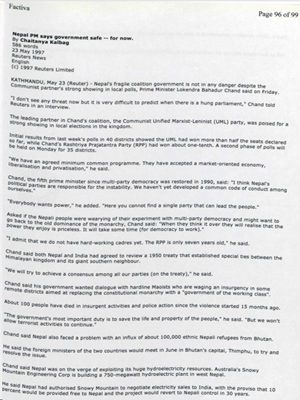Nepal PM says government safe — for now
[Reuters]
Published date: 23rd May 1997
23 May 1997
Reuters News
English
(c) 1997 Reuters Limited
KATHMANDU, May 23 (Reuter) – Nepal’s fragile coalition government is not in any danger despite the Communist partner’s strong showing in local polls, Prime Minister Lokendra Bahadur Chand said on Friday.
“I don’t see any threat now but it is very difficult to predict when there is a hung parliament,” Chand told Reuters in an interview.
The leading partner in Chand’s coalition, the Communist Unified Marxist-Leninist (UML) party, was poised for a strong showing in local elections in the kingdom.
Initial results from last week’s polls in 40 districts showed the UML had won more than half the seats declared so far, while Chand’s Rashtriya Prajatantra Party (RPP) had won about one-tenth. A second phase of polls will be held on Monday for 35 districts.
“We have an agreed minimum common programme. They have accepted a market-oriented economy, liberalisation and privatisation,” he said.
Chand, the fifth prime minister since multi-party democracy was restored in 1990, said: “I think Nepal’s political parties are responsible for the instability. We haven’t yet developed a common code of conduct among ourselves.”
“Everybody wants power,” he added. “Here you cannot find a single party that can lead the people.”
Asked if the Nepali people were wearying of their experiment with multi-party democracy and might want to go back to the old dominance of the monarchy, Chand said: “When they think it over they will realise that the power they enjoy is priceless. It will take some time (for democracy to work).”
“I admit that we do not have hard-working cadres yet. The RPP is only seven years old,” he said.
Chand said both Nepal and India had agreed to review a 1950 treaty that established special ties between the Himalayan kingdom and its giant southern neighbour.
“We will try to achieve a consensus among all our parties (on the treaty),” he said.
Chand said his government wanted dialogue with hardline Maoists who are waging an insurgency In some remote districts aimed at replacing the constitutional monarchy with a “government of the working class”.
About 100 people have died in insurgent activities and police action since the violence started 15 months ago,
The government’s most important duty is to save the life and property of the people,” he said. “But we won’t allow terrorist activities to continue.”
Chand said Nepal also faced a problem with an influx of about 100,000 ethnic Nepali refugees from Bhutan.
He said the foreign ministers of the two countries would meet in June in Bhutan’s capital, Thimphu, to try and resolve the issue.
Chand said Nepal was on the verge of exploiting its huge hydroelectricity resources. Australia’s Snowy Mountain Engineering Corp is building a 750-megawatt hydroelectric plant in west Nepal.
He said Nepal had authorised Snowy Mountain to negotiate electricity sales to India, with the proviso that 10 percent would be provided free to Nepal and the project would revert to Nepali control In 30 years.
he said efforts to promote tourism, the country’s third-largest foreign exchange earner, were hamstrung by a lack of aircraft seats.
Chand said he hoped the South Asian Federation Games, due to be held in Kathmandu in March 1998, would help boost tourism.
He also said Nepal was thinking of setting up a Technology Park, but added that no specific plans had so far been worked out.
(c) Reuters Limited 1997






